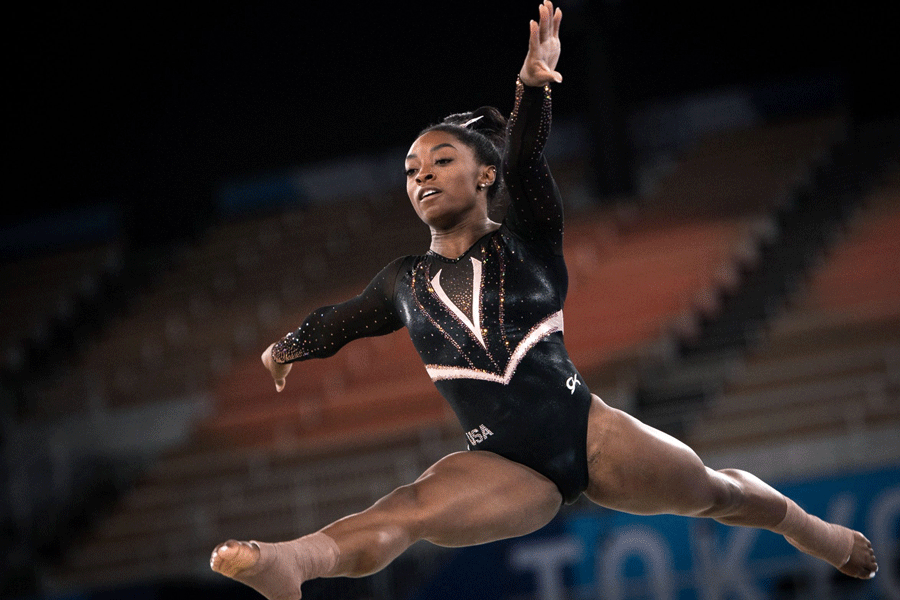USA Gymnastics was a house afire five years ago, the massive fallout surrounding the Larry Nassar sexual abuse scandal rendering one of the U.S. Olympic movement's marquee programs radioactive.
Lawsuits. Bankruptcy. Potential decertification. A revolving door at the top as CEOs incapable or unwilling to find a path forward came and went. Sponsorships vanished.
And perhaps most damaging of all: the erosion of trust between the organization and its tens of thousands of members, from the men and women competing at this week's Olympic trials to club owners to coaches to the parents of kids just starting out.
Before Li Li Leung took the job as president and CEO of the flailing national governing body in early 2019, the former Michigan gymnast turned NBA executive asked a longtime mentor for guidance.
“He said to me You have the opportunity to be a part of potentially the greatest turnaround in sporting history, how can you not take it?'” Leung told The Associated Press. “And I'm like, 'That's pretty compelling.'"
So is the progress.
Five-plus years after taking over, things are improving. Not perfect — fitting for a sport where perfection is essentially unattainable — but better. Legally, fiscally and Leung believes, culturally.
A packed Target Center will be awash this weekend with the logos of blue-blood corporate partners that fled in the wake of the Nassar revelations. Underneath the rebranded USA Gymnastics logo, athletes eyeing a spot in Paris will compete in an environment they believe is in a far healthier place than it was between the 2016 and 2020 Olympics.
Few have watched this methodical evolution unfold more closely than seven-time Olympic medalist Simone Biles. The 27-year-old superstar publicly identified herself as a Nassar victim in early 2018 and has never shied away from taking those in power to task. Asked recently where her relationship with USA Gymnastics stands as she aims for a third trip to the Games, Biles strikes a more conciliatory tone.
“I think it's changed because a lot of the people in there have changed,” she said. “They have stepped up to the role. They've done the work. They put in the work.”
Leung wants to get something straight. She didn't intend to hire an executive leadership team comprised entirely of women — from Chief Operating Officer to the organization's first-ever Chief of Athlete Wellness on down — to mirror the makeup of an organization whose membership is 85% female. It just sort of happened.
There were specific qualities Leung was looking for as she tried to put together a group that could help lead USA Gymnastics out of the wilderness, and one she was trying to avoid.
“They couldn't possess any ego at all,” Leung said. “I knew in order for us to do what we had to do ... they had to realize it wasn't about them as an individual, but it was about the wider mission, the wider purpose of what we're trying to achieve.”
Enter people like Stefanie Korepin. A former member of the U.S. rhythmic gymnastics national team in the late 1990s and early 2000s, Korepin admits she “wanted nothing to do with” the sport when she retired.
Korepin earned her MBA and went into the corporate world before realizing the sport was in her blood. She began moonlighting as a judge before eventually becoming an interim board member in 2018, a decision that eventually led Korepin to her current role as chief program director.
Korepin remembers feeling "a bit disillusioned" as a national team member, a time when she felt decisions were made in the dark and never explained. The result was “a lot of distrust.”
One of her guiding principles has been trying to pull the veil back as much as possible. This weekend, when the selection committees meet to pick the men's and women's Olympic teams, there will be an independent observer in the room who will later submit a detailed report on how the committee arrived on who's in and who's out.
USA Gymnastics has also implemented a new athlete funding model, a tiered system based on performance that provides very specific guidelines for each discipline — from women's artistic gymnastics down to non-Olympic sports like double mini-trampoline.
Gone is the mystery of how the money is divided. In its place is the kind of peace of mind Korepin didn't have when she was competing.
The organization also divided the responsibilities at the top of the women's elite program, creating a new paradigm that includes 2008 Olympians Chellsie Memmel and Alicia Sacramone Quinn working together to guide a five-woman team that will arrive in Paris as heavy gold-medal favorites.
Biles dragged the importance of mental well-being into the spotlight when she withdrew from multiple finals at the 2020 Olympics due to what she labeled " The Twisties."
As part of its sponsorship agreement with an apparel company, USA Gymnastics began setting aside money that reimburses national team members and their coaches for visits to mental health professionals when they're back home.
Leung described interest and participation in the program as “really good," adding it was important to make sure the services weren't limited strictly to the athletes.
“Athlete-centricity means supporting the entire ecosystem that supports the athletes,” Leung said. “And supporting the coaches is really important.”
That support can come in different forms. And species.
USA Gymnastics makes therapy dogs, led by Beacon, a golden retriever, a staple at major events. The idea came from rhythmic gymnastics vice president Caroline Hunt — who advocated for it for several years — and Leung, who witnessed the effect comfort dogs had on her father during a hospital stay.










